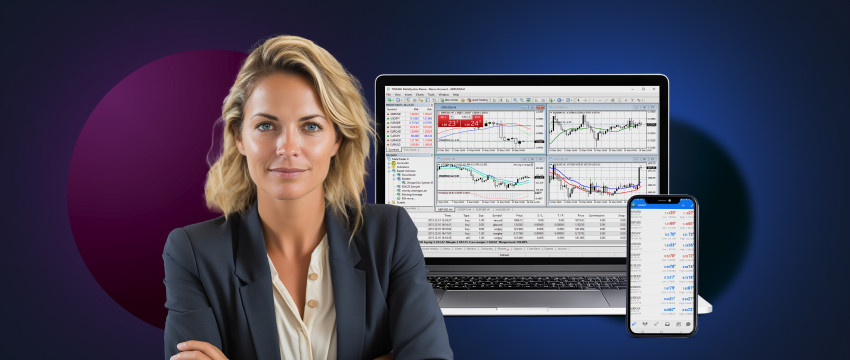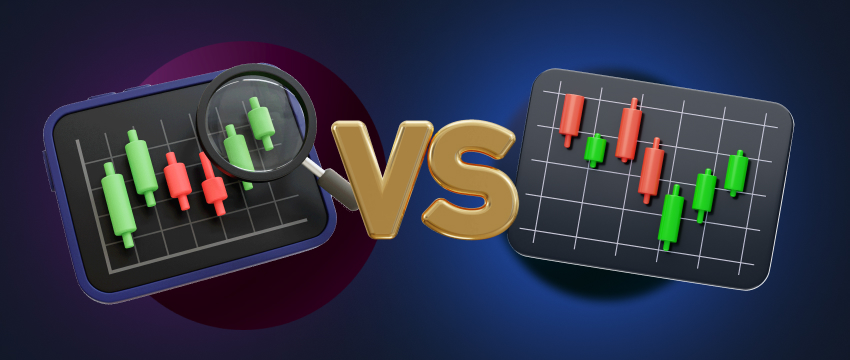CFD trading has become a popular method for traders to participate in the financial markets without having to invest in (own) physical assets. For one, CFDs offer leverage, enabling an individual to open larger trades with relatively little capital.
More than this, they also give traders access to an extensive variety of underlying assets, be they forex currency pairs, cổ phiếu, hàng hóa, chỉ số, and more. However, to increase one’s potential for generating decent profits ultimately depends on knowledge, skill, education, strategy, and a robust trading psychology.

Widening Knowledge for CFD traders
A diligent trader invests their time into ongoing learning to widen their scope of knowledge. They recognize the power of keeping informed to make more strategic trading decisions and to increase their chances of success.
Access to trading-related education has become very quick and convenient today what with the internet. Hundreds of thousands of resources are available online, the large majority for free, including blogs, videos, podcasts, and many more. Using credible resources is vital however to ensure that what you’re learning is accurate and true. Don’t fall victim to false promises of 100% success guaranteed. They’re likely to be a scam, and virtually impossible to achieve anyway.
Reputable brokers like T4Trade offer investors a wealth of insightful material to familiarise themselves with the ins and outs of CFD trading. This includes videos-on-demand, blogs, e-books, and more, all of which are suitable to traders at different levels.
Advanced Skill Boosting for CFD Traders
Practice is key to increasing your potential for making a profit from your trades. One of the best ways to gain that practice is by signing up for a demo trading account. A demo account will provide you with a simulated trading environment in which to implement different CFD strategies in order to establish which one aligns best with your budget, expertise và risk tolerance.
Using virtual funds, you can open and close CFD positions and journal results, giving you historical data to look back on, analyse, and tweak future trading behaviours if required.
Additionally, using a demo account, you can learn how to apply technical và fundamental analysis to potential positions. The MetaTrader 4 trading platform, for example, is highly renowned for its advanced analysis tools, offering practically everything a trader needs to enter trades more strategically and with appropriate data in hand.

Psychological Techniques for CFD Traders
CFD trading is notorious for being highly stressful. There are many ways to trade CFDs as well, be this via swing trading, scalping, giao dịch trong ngày, and more. Several of these strategies are incredibly fast-paced and involve entering and exiting trades in a matter of minutes or seconds. Having to keep up with this speed can see even the most composed trader succumbing to increased anxiety.
This is where the concept of trading psychology stems. It refers to the ability to handle one’s emotions in an effective manner, so that they don’t drive trading behaviours, often times adversely. So how is one able to become more think-skinned in order to improve their trading psychology? What are some of the key ways to mitigate the challenges so inherent to trading CFDs?
1. Avoid excessive trading
Regardless of how well your trades are performing, resist the urge to overtrade. Don’t let feelings of excitement, overconfidence or greed become that overwhelming resulting in emotional trading.
Instead, base your trading decisions on hard data. Try and maintain objectivity rather than feelings which can often lead to poor judgement.
2. Journal your CFD trading activity
Keep a record of your trades. Sometimes, writing down what we do acts as a great reference point for determining or modifying future behaviors. Journal what trades you executed and why.
Also document your emotional state at the time you opened or closed certain positions. This historical record will give you great insights into why you made certain decisions or behaved in a particular way, allowing you to make relevant adjustments, if and where needed.
3. Temperament-Aligned Risk: CFD Traders
Be mindful of how much risk you’re willing to take on. Listen to your gut. Don’t be arrogant and assume that you’re able to take on more risk that you’re comfortable with. Ensure your risk management strategies align with your risk tolerance. This can help alleviate the anxiety associated with the possibility of losing all your investment.
4. Start off with a demo trading account
It’s advisable to start with a demo trading account to practice CFD trading before transitioning to live trading. A demo account allows you to trade using virtual money, allowing you to execute multiple trades and evaluate the outcomes without the hindrance of negative emotions, as you won’t be risking your own money.
5. Keep your education current.
Ongoing learning is vital for keeping your skills current and staying updated on new technologies and trends. Continuously acquiring new information will likely help you make objective trading decisions rather than have them be driven by emotions or impulse.
T4Trade’s Academy provides a wealth of educational resources in an online format. Whether you prefer ebooks, videos, or podcasts, there’s something for everyone. The CFD broker’s insightful blogs cover CFD trading fundamentals, which can enhance your knowledge base.
Sticking to a trading plan
A well-defined, strategic trading plan is crucial in CFD trading for many reasons. For one, it helps a trader maintain focus, discipline and consistency, ensuring that trading decisions are based on a structured framework rather than emotional impulses.
A trading plan also includes risk management strategies like stop-loss orders, take-profit orders và trailing stops, reducing the the trader’s potential for loss.
Moreso, trading plans provide a benchmark against which traders can measure their performance. This allows them to identify what works and what doesn’t, allowing for continuous improvement. Finally, a trading plan also allows traders to set realistic goals and monitor their progress towards achieving them, providing a sense of direction.

Creating an effective risk management plan
As we’ve already mentioned, your trading plan should incorporate robust risk management strategies. But what does this mean in a practical sense?
- Properly define your entry and exit points, using technical or fundamental analysis to assist with the process.
- Be very careful when handling leverage, ensuring it concurs with your budget and goals, and doesn’t eat into money you don’t have or shouldn’t be using.
- Monitor position size. Remember, you’re working with a set amount of funds that should be safeguarded as best you can.
- Establishing risk indicators to monitor significant market fluctuations.
- Use stop-loss or take-profit orders – either to limit loss or lock in profit.
- Diversify your trading portfolio across different asset classes to reduce exposure to any single risk. Apply this logic to choice of sectors/industries, too.
- Stay updated with the latest news and market developments, which must also include monitoring economic indicators.
Picking a reputable broker
Choosing a suitable CFD broker is a vital part of one’s CFD trading journal. Ultimately, you want a broker who best aligns with your objectives, and seeks to help you improve your skills as a trader to potentially achieve greater success. T4Trade is a leading global broker that is popular for many reasons. It offers a diverse range of trading accounts for traders of any level to pick from.
Their multilingual customer support team is available via Live Chat or email 24/5 to answer your most pressing trading questions or help you solve problems that you may encounter.
In addition, T4Trade traders also enjoy flexible trading conditions, quick execution of trades, competitive spreads, và fast withdrawal or deposit of funds.
Khước từ trách nhiệm: This material is for general informational and educational purposes only and should not be considered investment advice or an investment recommendation. T4Trade is not responsible for any data provided by third parties referenced or hyperlinked in this communication.




